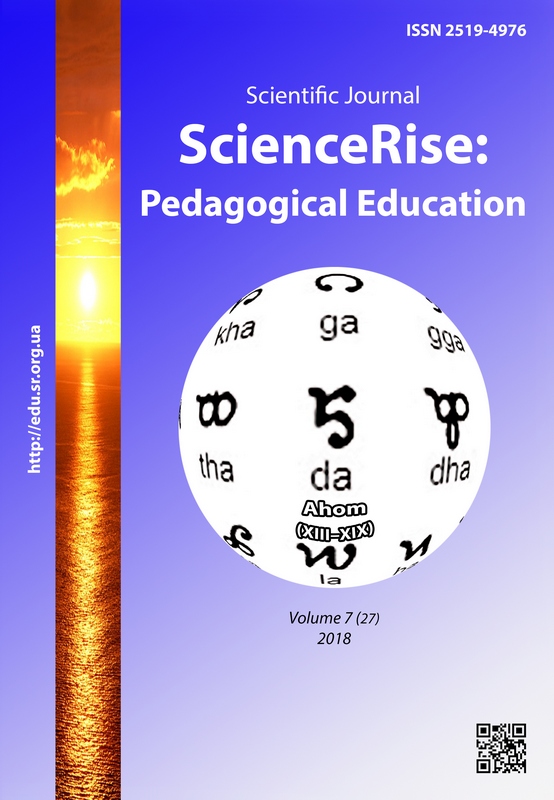Analysis of the level of knowledge of pediatric propaedeutics, taught in junior courses among young doctors
DOI:
https://doi.org/10.15587/2519-4984.2018.153376Keywords:
motivational learning, competition, student, propaedeutic pediatrics, examination methodology, symptomsAbstract
The process of training in a higher medical school involves not only acquisition of professional knowledge and skills, but also successful mastery of clinical thinking and the ability to communicate with patients. As a result, students can become qualified specialists in a certain area of medicine. Modern higher medical education requires higher students' motivation provided with the introduction of new teaching forms and methods into the educational process. The tendency to low proficiency level among young specialists, according to the works of many authors, was the reason for conducting an analysis of knowledge assessment on the propaedeutics of pediatrics among 6th-year students. To implement the assessment, the «Young Clinician» Competition for university graduates was held at the Department of Pediatric Diseases of Dnepropetrovsk Medical Academy. The competitors had to demonstrate their knowledge of child examination methods and semiotics of childhood diseases. The results obtained by students were highly correlated with their current performance. However, in general, the knowledge of semiotics turned out to be higher than the knowledge of child examination methods, which shows that it is necessary to enhance practical skills obtained in propaedeutics of pediatrics for senior students. The feedback received from the students after the competition proved that their interest was justified, and the results of the competition made us pay attention to problematic issues. A weighty problem that leads to deterioration in the mastering of patient's examination methodology is the reduction of hours in the discipline, which is unacceptable in this situation. The development and introduction of new teaching methods are necessary to increase students’ motivation in modern educational system, where the teacher’s personality plays an important role in teaching. The competition results will serve as the basis for further development of motivating programs for students in the department in order to attract more active students, thereby increasing interest in the discipline
References
- Malykhin, O. V., Pavlenko, I. H., Lavrentyeva, O. O., Matukova, H. I. (2011). Metodyka vykladannya u vyshchiy shkoli [Methodology of teaching in high school]. Simferopol: Daifi, 270.
- Hay, L. A., Sukhin, Yu. V., Venher, V. F., Sayed, Muksen, Serdyuk, V. V. (2016). Suchasni metody vykladannya medychnykh dystsyplin u vyshchiy shkoli [Modern methods of teaching medical disciplines in higher education]. Medical education, 1, 15–18.
- Ilchenko, S. I., Mishina, N. V., Efanova, A. O. (2017). Situation in dominant motives of students’ training at the department of propaedeutic pediatrics. Child`S health, 12 (2), 188–192. doi: http://doi.org/10.22141/2224-0551.12.2.2017.99779
- Lutsyk, I. H. (2007). Vykorystannya interaktyvnykh metodiv yak zasib stvorennya intensyvnoho osvitnoho seredovyshcha [Use of interactive methods as a means of creating an intensive educational environment]. New learning technologies, 46, 59–63.
- Shakurov, A. A. (2016). Metodyko-pedahohycheskye uslovyya formyrovanyya professyonalnykh kompetentsyya u studentov sovremennoho VUZa [Methodological and pedagogical conditions of formation of professional competence at students of modern high school]. Methodology of teaching in higher school, 5 (19-1), 163–168.
- Fit'mova, A. A. (2010). Issledovaniye motivatsionnoy struktury lichnosti budushchikh vrachey [The study of the motivational structure of the personality of future doctors]. Proceedings of the Volgograd State Technical University, 9 (69), 62–67.
- Chizhkova, M. B. (2015). Motivy vybora professii vracha i ikh vzaimosvyaz' s professional'no-znachimymi kachestvami meditsinskogo rabotnika u studentov-pervokursnikov meditsinskogo VUZa [ The motives for choosing the profession of a doctor and their relationship with the professionally significant qualities of a medical worker among first-year students of a medical university]. Modern problems of science and education, 2 (1). Available at: https://www.science-education.ru/ru/article/view?id=21057 Last accessed: 03.08.2015
- Makarova, V. Y., Babykova, Y. V., Plaksyn, V. A. (2010). Élektronnyymodul uchebno-metodycheskoho kompleksa dystsyplyny «Propedevtyka detskykh bolezney» [Electronic module of educational-methodical complex of discipline "Propedeutics of childhood diseases"]. Succeedes of modern natural sciences, 10, 72–74.
- Yaroshevska, T. V. (2017). Osoblyvosti praktychnoy i pidhotovky anhlomovnykh studentiv z propedevtyky pediatriyi [Features of practical training of English-speaking students from propaedeutics of pediatrics]. Ternopil, 196–197.
- Skryabina, K. V., Yaroshevska, T. V. (2018). Osobennosty provedenyya konkursa «Molodoy klynytsyst» po propedevtyke pedyatryy [Features of holding a competition "Young Clinician" in propedeutics of pediatrics]. Medical Science 2018. Poltava, 66–67.
- Rakytya, L. (2014). 10 oshybok molodykh vrachey [10 mistakes of young doctors]. Cathrenstil, 130. Available at: https://www.katrenstyle.ru/articles/journal/medicine/ethics/10_oshibok_molodyih_vrachey Last accessed: 24.12.2014
- Sanders, C. W., Edwards, J. C., Burdenski, T. K. (2004). A Survey of Basic Technical Skills of Medical Students. Academic Medicine, 79 (9), 873–875. doi: http://doi.org/10.1097/00001888-200409000-00013
- McGaghie, W. C. (2015). Mastery Learning: It Is Time for Medical Education to Join the 21st Century. Academic Medicine, 90, 1438–1441. doi: http://doi.org/10.1097/acm.0000000000000911
Downloads
Published
How to Cite
Issue
Section
License
Copyright (c) 2018 Tatyana Yaroshevskaya, Svetlana Ilchenko, Ekaterina Skryabina, Natalya Kramarenko

This work is licensed under a Creative Commons Attribution 4.0 International License.
Our journal abides by the Creative Commons CC BY copyright rights and permissions for open access journals.
Authors, who are published in this journal, agree to the following conditions:
1. The authors reserve the right to authorship of the work and pass the first publication right of this work to the journal under the terms of a Creative Commons CC BY, which allows others to freely distribute the published research with the obligatory reference to the authors of the original work and the first publication of the work in this journal.
2. The authors have the right to conclude separate supplement agreements that relate to non-exclusive work distribution in the form in which it has been published by the journal (for example, to upload the work to the online storage of the journal or publish it as part of a monograph), provided that the reference to the first publication of the work in this journal is included.








